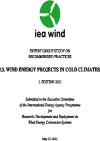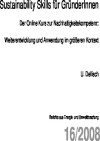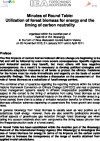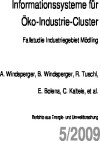Suchergebnisse
5. Internationale Tage des Passivhauses
7. - 9. Nov 2008
ganz Österreich
Wien, Mödling, Schwanenstadt u. a. , AT
An den Tagen des Passivhauses ermöglichen Bauherren und Eigentümer von Passivhäusern Besuche in bewohnten Passivhäusern. Überwiegend handelt es sich um private Wohnbauten, aber auch Bürogebäude, Schulen und Kindergärten können besichtigt werden.
Tagung: 5. Nationale Photovoltaik-Tagung
25. Mar 2004 -
26. Mar 2004
ETH ZürichZürich, CH
Integration Solarstrom - Architektur
6. Internationale Tage des Passivhauses
6. - 8. Nov 2009
Aktivitäten in ganz Österreich, AT
Bauherren und Eigentümer von Passivhäusern ermöglichen Besuche in bewohnten Passivhäusern.
Conference: ECTP-E2BA-Eracobuild Conference 2011
4. - 5. October 2011
Radisson Blu Centrum HotelWarsaw, Grzybowska 24Warsaw, PL
European Construction Technology PLattform (ECTP)
4. Internationale Tage des Passivhauses
9. bis 11. November 2007
in allen Bundesländern, AT
Bewohner von Passivhäusern in ganz Österreich öffnen ihre Häuser und stehen Interessierten Rede und Antwort.
Highlights der Bioenergieforschung I
28. April 2009
Haus der Musik, Seilerstätte 30
1010 Wien, AT
Nationale und internationale Ergebnisse zu den IEA Schwerpunkten
Konferenz: Smart Grids Week - Linz 2011
24. - 27. Mai 2011
Power Tower der Energie AG Oberösterreich, Böhmerwaldstrasse 34021 Linz, AT
Die Smart Grids Week - Linz 2011 soll entscheidend dazu beitragen, den in Österreich erfolgreich begonnenen Prozess der Weiterentwicklung der Elektrizitäts-Infrastrukturen weiter zu stärken und die Anbindung an die internationalen Entwicklungen zu forcieren.
Konferenz: Smart Grids Week Linz 2016
9. - 13. Mai 2016
Linz AG, Wiener Straße 1514021 Linz, AT
Thema der Smart Grids Week 2016 waren Dezentrale digitale Energiewelten.
Universitätslehrgang: Solararchitektur
6. Oct 2003 -
24. Jun 2005
Donau-Universität KremsKrems a.d. Donau, AT
berufsbegleitender Universitätslehrgang im Fachbereich des nachhaltigen Planens und Bauens
9. Info-Tag für Wärmepumpenhersteller
11. Oktober 2013
AIT - Austrian Institute of Technology Giefinggasse 2, 3. Stock, Raum 3011210 Wien, AT
Auch dieses Jahr lädt das AIT - Austrian Institute of Technology gemeinsam mit dem Bundesministerium für Verkehr, Innovation und Technologie (BMVIT) zum Info-Tag für Wärmepumpenhersteller.
Konferenz: Wood-Plastic Composites 2010
20. - 22. April 2010
The Imperial Riding School Hotel, Ungargasse 60
1030 Wien, AT
Internationale Konferenz mit Teilnehmern aus der ganzen Welt - auch Entwicklungen von WPC in den USA und Asien werden vorgestellt.
IEA Technology Roadmap Carbon Capture and Storage (2009)

Die Roadmap dokumentiert den Stand der Technik, den FTE- und Investitionsbedarf sowie die Rahmenbedingungen für die Technologie.
Englisch
ExpertInnen - Workshopreihe
Im Rahmen des Strategieprozesses Smart Grids 2.0 finden von Herbst 2013 bis Herbst 2014 neben den Stakeholder-Workshops der Teilprozesse "Roadmap" und "Strategic Research Agenda" folgende acht ExpertInnenworkshops statt.
"1000 Passivehouses in Austria" - Passive house object databank

The first joint project of the four IG passive house organisations on behalf of the programme line "Building of Tomorrow" - an initiative of the Federal Ministry for Transport, Innovation and Technology - for the purpose of setting up a detailed network documentation of 80% of all passive houses in Austria.
IEA Bericht: Windkraftprojekte in kalten Klimaten

International Energy Agency, Task 19
Englisch, 43 Seiten
Downloads zur Publikation
Working document: "The Biorefinery Complexity Index"

Das Working Document beschreibt die Grundlagen, wie die Komplexität von Bioraffinerien bewertet werden kann, wobei der Technology Readiness Level (TRL 1 - 9) und die Anzahl der Plattformen, Rohstoffe, Produkte und Prozesse von Bioraffinerien berücksichtigt werden.
Sustainability Skills für GründerInnen

Der Online Kurs zur Nachhaltigkeitskompetenz:
Weiterentwicklung und Anwendung im größeren Kontext
Schriftenreihe
16/2008
U. Dellisch
Herausgeber: BMVIT
Deutsch, 157 Seiten
Downloads zur Publikation
Task 38 Roundtable (25.11.2010, 31.1.2011 & 8.4.2011)

Energetische Nutzung der forstlichen Biomasse und zeitliche Betrachtung der Kohlenstoffneutralität
Herausgeber: BMVIT
Downloads zur Publikation
Informationssysteme für Öko-Industrie-Cluster

Fallstudie Industriegebiet Mödling
Schriftenreihe
05/2009
A. Windsperger, B. Windsperger, R. Tuschl, E. Bolena, C. Kalteis, et al.
Herausgeber: BMVIT
Deutsch, 204 Seiten
Downloads zur Publikation
MODESTORE - Modular High Energy Density Sorption Heat Storage

Seasonal storage of solar heat for use in low energy and passive houses (new buildings as well as old buildings).
